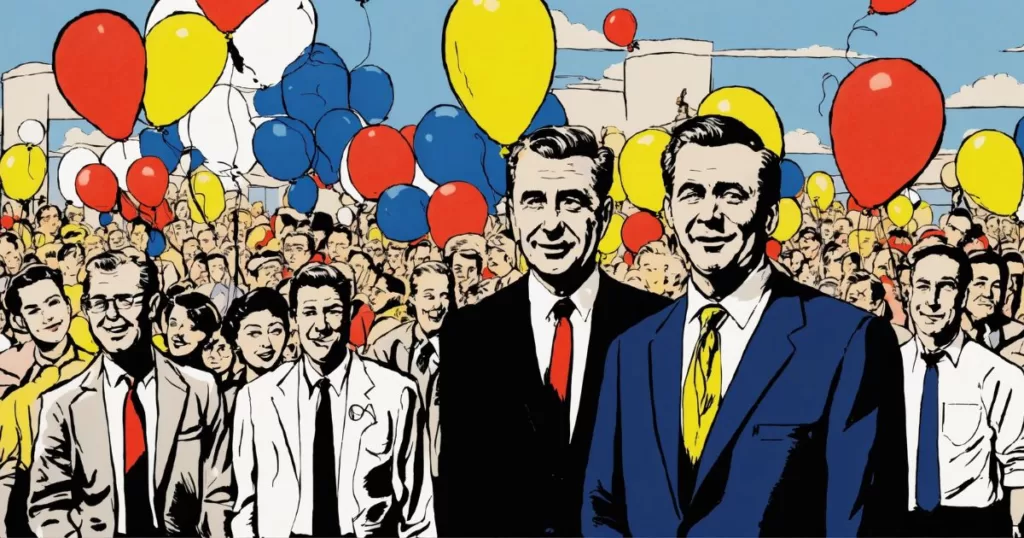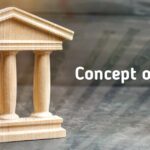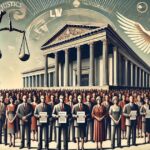Ideology: A Step by Step Guide will help you to deep understanding Ideology. Ideology is a concept that holds immense significance in understanding human behavior, societal systems, and political landscapes. In this blog post, we will delve into the depths of ideology, unpacking its meaning, exploring its origins, and analyzing its scope. By the end, you will have a comprehensive understanding of ideology, its profound impact on society, and the need to examine its concepts.
A. Origins and Evolution of Ideology
Ideological thought has a rich history that has evolved over centuries. From the political philosophies of ancient Greece to the Enlightenment thinkers and the ideological movements of the 19th and 20th centuries, the concept of ideology has shaped the course of human history. Key thinkers like Karl Marx, Friedrich Nietzsche, and John Locke have contributed significantly to the development of ideological thought.
Definitions and Perspectives:
Political ideology refers to a set of interconnected ideas, beliefs, values, and principles guiding governance, societal structures, and individual rights. Key philosophers like John Stuart Mill, Karl Marx, and Hannah Arendt provided diverse definitions, reflecting the dynamic nature of political thought.
1. John Stuart Mill:
– Mill defined political ideology as a systematic set of political, economic, and social beliefs that individuals and societies adhere to. He emphasized the importance of open debate and the clash of ideas in refining political thought.
2. Karl Marx:
– Marx viewed ideology as a reflection of the dominant economic class’s interests. He argued that ideologies serve to justify the existing power structures and that they change as material conditions change.
3. Hannah Arendt:
– Arendt focused on the role of political ideologies in shaping human behavior and societal norms. She explored how ideologies influence public and private realms, impacting political participation and identity.
B. Understanding the Nature of Ideology
Ideology can be viewed as a set of interconnected beliefs and values that guide individuals, societies, and political systems. It serves as a lens through which people interpret the world around them, shaping their perceptions and influencing their actions. Moreover, ideology acts as a source of identity and social cohesion, allowing individuals to connect with like-minded individuals and form communities based on shared values.
C. The Complex Nature of Ideology
Ideology is not a monolithic entity; it encompasses multiple dimensions that interact with and affect one another. These dimensions include political, economic, social, and cultural aspects. Furthermore, ideology and power are deeply intertwined, as ideological systems often serve to justify and maintain existing power structures. Additionally, ideology is not a static concept; it adapts and evolves over time in response to changing political and societal circumstances.
Analyzing the Scope of Ideology
A. Political Ideologies
Political ideologies encompass a wide range of beliefs and value systems that shape political systems and policies.
Liberalism promotes individual liberties and limited government intervention, while conservatism emphasizes tradition and stability. Socialism, on the other hand, seeks to create a more equitable society by addressing the inequalities inherent in capitalism.
B. Economic Ideologies
Economic ideologies tackle the organization and distribution of resources within a society. Capitalism, with its emphasis on a market-based economy and private ownership, has been a dominant force in many societies. Marxism offers a critique of capitalism and advocates for a classless society. A mixed economy finds a middle ground, combining elements of both capitalism and government intervention.
C. Ideology in Social and Cultural Contexts
Ideologies also shape social and cultural domains. Religious ideologies exert a significant influence on people’s values, beliefs, and behaviors. Nationalism fosters a sense of identity and unity among individuals, often with implications for political and social structures. Feminism, as an ideological quest for gender equality, challenges societal norms and addresses issues of gender discrimination.
Exploring the Understanding Ideology: A Step by Step Guide
A. Ideology and Human Behavior
Psychological aspects play a crucial role in shaping individual ideological beliefs. People are often drawn to ideologies that resonate with their experiences, needs, and desires. Moreover, socialization, through education, family, and media, plays a fundamental role in shaping and reinforcing ideological orientations. Ideology also influences decision-making processes, as individuals evaluate options based on their ideological frameworks.
B. Ideology as a Catalyst for Change
Throughout history, ideology has fueled revolutions and transformative movements. From the American Revolution to the Civil Rights Movement, ideological motivations have been instrumental in driving change and challenging oppressive systems. However, implementing ideological principles can also face challenges and setbacks, as societal resistance and power dynamics come into play.
Impact of Political Ideology:

The impact of political ideology on the government, people, and society requires a nuanced understanding of different ideologies and their implications. Here’s a detailed breakdown:
1. Government:
– Policy Formulation: Political ideologies significantly influence the development and implementation of government policies. For example, liberal ideologies may emphasize individual rights and social welfare, leading to policies supporting healthcare and education. On the other hand, conservative ideologies might prioritize limited government intervention in economic affairs.
– Power Structures: The chosen political ideology shapes the structure of the government. Authoritarian ideologies tend to concentrate power in a central authority, while democratic ideologies distribute power among elected representatives. This impacts decision-making processes, accountability, and the protection of individual rights.
2.People:
– Identity and Belonging:
Political ideologies often contribute to the formation of people’s identities. Individuals may align themselves with a particular ideology, influencing their values, beliefs, and social affiliations. This sense of belonging can foster unity or division within a society.
– Rights and Freedoms:
Different ideologies have distinct views on individual rights and freedoms. Liberal ideologies may champion civil liberties, while conservative ideologies may prioritize societal stability over individual freedoms. This affects how people perceive and exercise their rights.
3. Society:
– Social Equality:
Political ideologies play a crucial role in shaping attitudes towards social equality. Progressive ideologies may advocate for social justice and equal opportunities, while conservative ideologies may stress the importance of traditional social hierarchies. These perspectives impact the distribution of resources and opportunities in society.
– Cultural Values:
Ideologies often reflect and shape cultural values. For instance, nationalist ideologies may emphasize cultural preservation and national identity, influencing societal norms and behaviors. Multicultural or globalist ideologies, on the other hand, may encourage diversity and inclusivity.
4. Economic Systems:
– Resource Allocation:
Political ideologies guide economic policies, determining how resources are distributed. Socialist ideologies may favor wealth redistribution, while capitalist ideologies may emphasize free-market principles. This affects economic inequality, access to resources, and overall economic stability.
– **Innovation and Entrepreneurship:** Ideological preferences influence attitudes towards innovation and entrepreneurship. Capitalist ideologies may encourage free-market competition and innovation, while socialist ideologies may focus on collective ownership and planned economies.
5. International Relations:
– Foreign Policy:
Political ideologies shape a country’s approach to international relations. Isolationist ideologies may promote self-sufficiency and limited engagement, while interventionist ideologies may advocate for active involvement in global affairs. This affects diplomatic relationships, alliances, and responses to global challenges.
In short Political ideologies have a profound impact on the government, people, and society, influencing policies, identities, social structures, economic systems, and international relations. Understanding these impacts is crucial for navigating the complexities of political landscapes and fostering informed civic engagement.
Conclusion:
In conclusion, the study of ideology is crucial for understanding how beliefs, values, and systems shape human societies. Ideology influences our behavior, motivates movements for change, and has a profound impact on society at large. By examining and analyzing ideological concepts, we can gain valuable insights into the complex dynamics that define our world.
FAQs:
Q.1. What is political ideology?
A. Political ideology is a set of interconnected ideas, beliefs, and values forming a comprehensive framework for understanding and organizing political life.
Q.2. Who are some key thinkers in political ideology?
A. Influential thinkers include John Locke, Karl Marx, Jean-Jacques Rousseau, and others who shaped political thought.
Q.3. How do political ideologies impact governance?
A. They influence policies, political systems, and economic structures, playing a crucial role in the formulation of laws and the design of institutions.
Q.4. What are the core principles of political ideology?**
A. Core principles include notions of individual rights, equality, and the role of government.
Q.5. How do cultural variations influence political ideologies?
A. Cultural contexts contribute to the diversity of ideological perspectives, leading to different approaches to governance and societal values.
Q.6. Is political ideology static or dynamic?
A. It is dynamic, evolving over time in response to new challenges, technological advancements, and global issues.
Q.7. What challenges does the “End of Ideology” concept face?
A. Challenges include its Western-centric focus, the rise of new ideological debates, and the persistence of ideological conflicts globally.
Q.8. How do political ideologies impact individuals?
A. They shape individual identities, influence societal norms, and impact community power dynamics.
People Also Read: Karl Marx’ Theory of Class Conflict: A Useful Guide.










